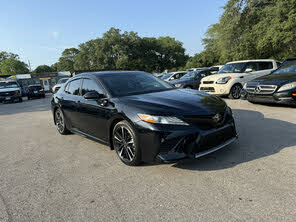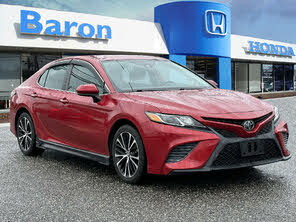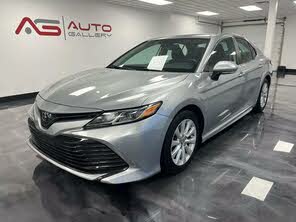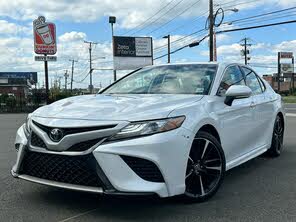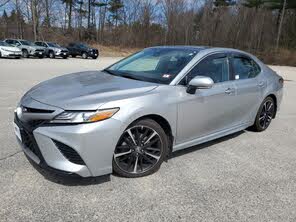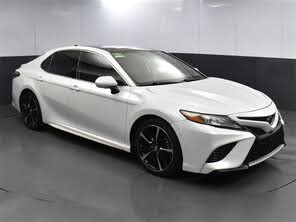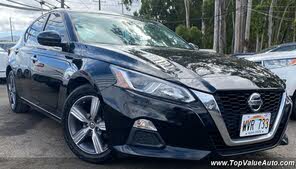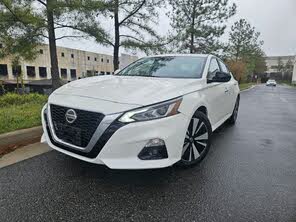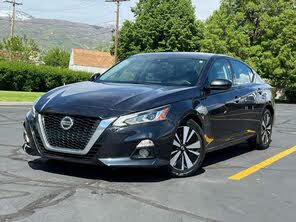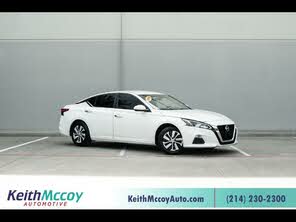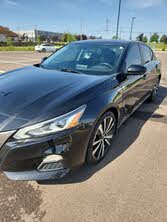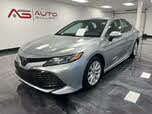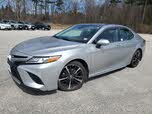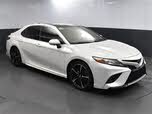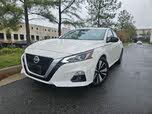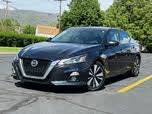2019 Nissan Altima vs 2019 Toyota Camry
CarGurus highlights
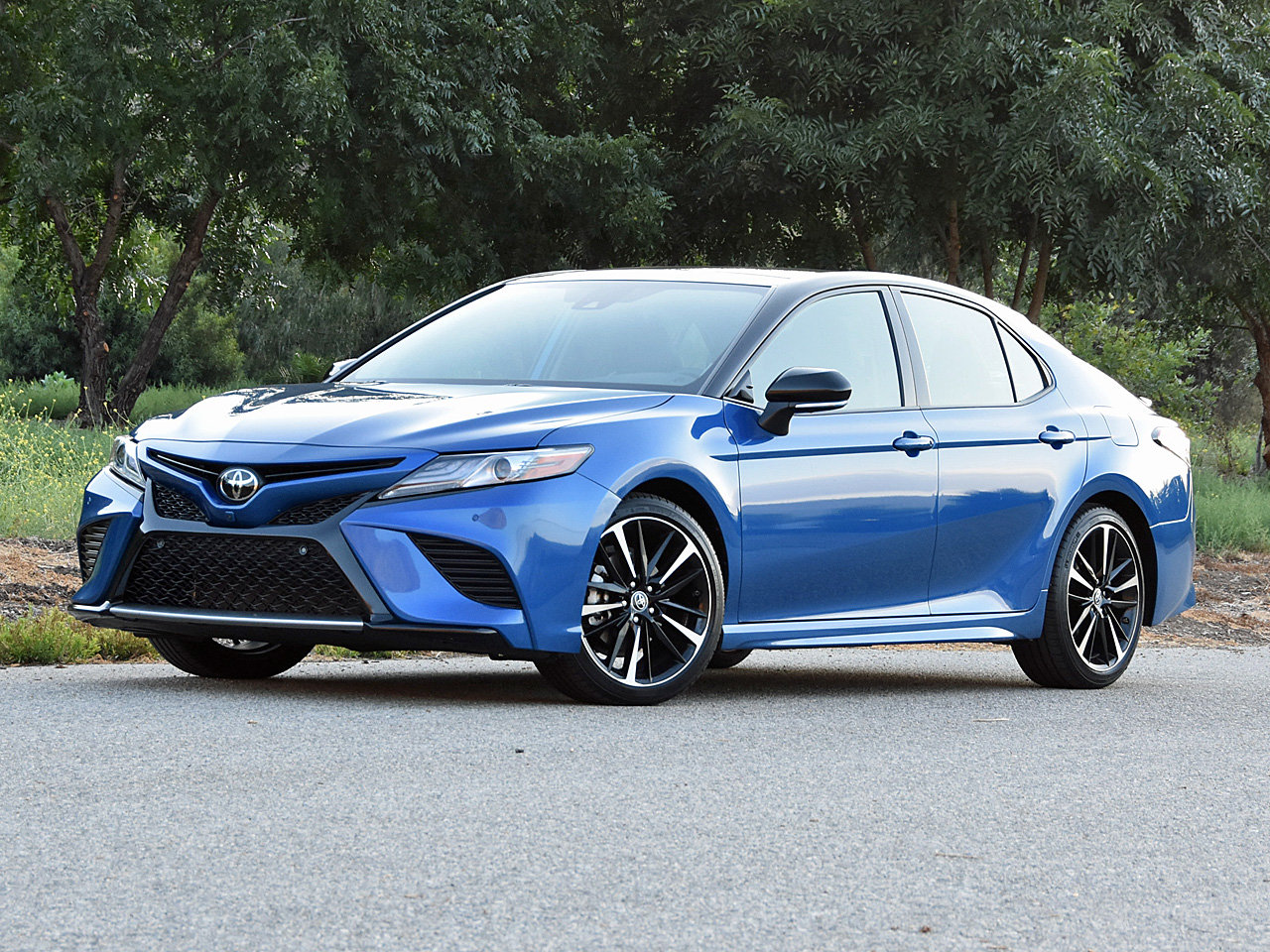
According to CarGurus experts, the overall rating for the 2019 Nissan Altima is 7.8 out of 10, while the 2019 Toyota Camry scores 7.8 out of 10. Given these identical ratings, the final decision hinges on individual priorities. If comfort, innovative seating, and AWD capability are high on your list, the 2019 Nissan Altima is the better choice. However, if you prioritize top-tier safety, robust engine performance, and comprehensive driver-assistance features, the 2019 Toyota Camry comes out ahead.
Choose the 2019 Toyota Camry if:
Shop Now- Safety is your top priority, evident from the Camry’s exemplary crash-test ratings.
- You seek a robust and engaging driving experience, especially with the 301-hp V6 engine.
- Comprehensive driver-assistance features and reliability are key factors in your decision.
Choose the 2019 Nissan Altima if:
Shop Now- You value innovative comfort, especially for long drives, thanks to the Zero Gravity seats.
- You prefer a straightforward and user-friendly infotainment system with traditional control options.
- All-wheel-drive capability in a sedan is important for you, providing confidence in various driving conditions.
Overview | |
MSRP$24,000 | MSRP$24,095 |
Average price$17,354 | Average price$21,006 |
Listings1241 | Listings1393 |
Ratings & Reviews | |
User Reviews | User Reviews |
Expert reviews7.8 out of 10 | Expert reviews7.8 out of 10 |
Pros
| Pros
|
2019 Nissan Altima Reviews SummaryShopping for a modern midsize sedan is tougher than you may think. Whether we're talking about the Honda Accord, Toyota Camry, Mazda6, or Hyundai Sonata, it seems like each year we conclude it can’t possibly get any better. Deciding among sedans is tough because nearly every player in the segment brings its absolute A game every year. The Nissan Altima is all-new for 2019 and delivers a ton of improvements. But considering the competition, are those improvements enough to launch it from a middling entrant to a serious contender? The previous Altima had some things going for it, like spacious seating and a powerful V6 (if you were willing to pay extra for it). And by the final year of its fifth generation, some driver-assistance features arrived as standard, but it never stood out in any particular area. For decades, buyers didn’t expect sedans to be anything more than reliable, economical daily commuters. But the pendulum has swung in the opposite direction. Check out the competition: The Honda Accord, Toyota Camry, Hyundai Sonata, and Mazda6 are all near-premium cars, with the latest infotainment and safety technology, and they handle well, too. The new Altima has some of those things—let's see how it delivers on the rest. | |
2019 Toyota Camry Reviews SummaryBlame the Toyota Avalon for the Toyota Camry’s flaws. In order to put daylight between itself and Toyota’s larger full-size sedan, the midsize Camry is now smaller than some of its competitors, while simultaneously offering fewer of the increasingly expected features in the segment. Still, there are several good reasons to consider a 2019 Camry, from its outstanding safety ratings to its free scheduled maintenance plan. It’s also one of a handful of family sedans that still offers a 6-cylinder engine. | |
Popular Features & Specs | |
Engine2.5L 188 hp I4 | Engine2.5L 203 hp I4 |
Drive TrainFWD | Drive TrainFWD |
Seating Capacity5 | Seating Capacity5 |
Horsepower188 hp @ 6000 rpm | Horsepower |
MPG City28 | MPG City29 |
MPG Highway39 | MPG Highway41 |
Engine | |
Engine Name2.5L 188 hp I4 | Engine Name2.5L 203 hp I4 |
Torque180 lb-ft @ 3600 rpm | Torque |
Horsepower188 hp @ 6000 rpm | Horsepower |
DrivetrainFWD | DrivetrainFWD |
Fuel Economy | |
MPG City28 | MPG City29 |
MPG Highway39 | MPG Highway41 |
Interior | |
Seating Capacity5 | Seating Capacity5 |
Safety | |
Front Crash Overall4 | Front Crash Overall5 |
Side Crash Overall5 | Side Crash Overall5 |
Dimensions & Capacity | |
Cargo Space15.4 cu ft | Cargo Space14.1 cu ft |
Curb Weight3212 lbs | Curb Weight3241 lbs |
Height56.7 in | Height56.9 in |
Length192.9 in | Length192.1 in |
Width72.9 in | Width72.4 in |
Wheelbase111.2 in | Wheelbase111.2 in |
Maximum Payload1116 lbs | Maximum Payload925 lbs |
Number of doors4 | Number of doors4 |
CarGurus highlights

According to CarGurus experts, the overall rating for the 2019 Nissan Altima is 7.8 out of 10, while the 2019 Toyota Camry scores 7.8 out of 10. Given these identical ratings, the final decision hinges on individual priorities. If comfort, innovative seating, and AWD capability are high on your list, the 2019 Nissan Altima is the better choice. However, if you prioritize top-tier safety, robust engine performance, and comprehensive driver-assistance features, the 2019 Toyota Camry comes out ahead.
Choose the 2019 Toyota Camry if:
Shop Now- Safety is your top priority, evident from the Camry’s exemplary crash-test ratings.
- You seek a robust and engaging driving experience, especially with the 301-hp V6 engine.
- Comprehensive driver-assistance features and reliability are key factors in your decision.
Choose the 2019 Nissan Altima if:
Shop Now- You value innovative comfort, especially for long drives, thanks to the Zero Gravity seats.
- You prefer a straightforward and user-friendly infotainment system with traditional control options.
- All-wheel-drive capability in a sedan is important for you, providing confidence in various driving conditions.
Overview | ||
MSRP | $24,000 | $24,095 |
Average price | $17,354 | $21,006 |
Listings | ||
Ratings & Reviews | ||
User reviews | 4.7 | 4.7 |
Expert reviews | 7.8 out of 10Read full review | 7.8 out of 10Read full review |
Pros & cons | Pros
| Pros
|
Summary | Shopping for a modern midsize sedan is tougher than you may think. Whether we're talking about the Honda Accord, Toyota Camry, Mazda6, or Hyundai Sonata, it seems like each year we conclude it can’t possibly get any better. Deciding among sedans is tough because nearly every player in the segment brings its absolute A game every year. The Nissan Altima is all-new for 2019 and delivers a ton of improvements. But considering the competition, are those improvements enough to launch it from a middling entrant to a serious contender? The previous Altima had some things going for it, like spacious seating and a powerful V6 (if you were willing to pay extra for it). And by the final year of its fifth generation, some driver-assistance features arrived as standard, but it never stood out in any particular area. For decades, buyers didn’t expect sedans to be anything more than reliable, economical daily commuters. But the pendulum has swung in the opposite direction. Check out the competition: The Honda Accord, Toyota Camry, Hyundai Sonata, and Mazda6 are all near-premium cars, with the latest infotainment and safety technology, and they handle well, too. The new Altima has some of those things—let's see how it delivers on the rest. | Blame the Toyota Avalon for the Toyota Camry’s flaws. In order to put daylight between itself and Toyota’s larger full-size sedan, the midsize Camry is now smaller than some of its competitors, while simultaneously offering fewer of the increasingly expected features in the segment. Still, there are several good reasons to consider a 2019 Camry, from its outstanding safety ratings to its free scheduled maintenance plan. It’s also one of a handful of family sedans that still offers a 6-cylinder engine. |
Video | ||
Popular Features & Specs | ||
Engine | 2.5L 188 hp I4 | 2.5L 203 hp I4 |
Drive Train | FWD | FWD |
Seating Capacity | 5 | 5 |
Horsepower | 188 hp @ 6000 rpm | |
MPG City | 28 | 29 |
MPG Highway | 39 | 41 |
Engine | ||
Engine Name | 2.5L 188 hp I4 | 2.5L 203 hp I4 |
Torque | 180 lb-ft @ 3600 rpm | |
Horsepower | 188 hp @ 6000 rpm | |
Drivetrain | FWD | FWD |
Fuel Economy | ||
MPG City | 28 | 29 |
MPG Highway | 39 | 41 |
Interior | ||
Seating Capacity | 5 | 5 |
Safety | ||
Front Crash Overall | 4 | 5 |
Side Crash Overall | 5 | 5 |
Dimensions & Capacity | ||
Cargo Space | 15.4 cu ft | 14.1 cu ft |
Curb Weight | 3212 lbs | 3241 lbs |
Height | 56.7 in | 56.9 in |
Length | 192.9 in | 192.1 in |
Width | 72.9 in | 72.4 in |
Wheelbase | 111.2 in | 111.2 in |
Maximum Payload | 1116 lbs | 925 lbs |
Number of doors | 4 | 4 |

By: CarGurus + AI
This car comparison has been created with using generative AI. It is based entirely on CarGurus expert review content, ratings and data, and leverages our extensive library of hands-on product tests to create thousands of unique comparisons to help shoppers choose the right car.

